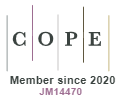Motor coordination of elderly women
DOI:
https://doi.org/10.5585/conssaude.v11n1.3085Keywords:
Aging, Exercise, physical, Motor activity, Motor skills, Psychomotor performance.Abstract
Introduction: Aging causes physical, motor and cognitive changes in people. To minimize these effects, the elderly should remain physically active in order to improve fundamental motor skills, such as motor coordination, to ensure a good state of health. Objective: To evaluate the motor coordination of elderly women who practice physical activity and those who do not. Methods: A total of 50 elderly women with a mean age of 65.91 ± 2.05 years participated in this study, of which 25 practiced physical activity (G1) and 25 did not (G2). In order to evaluate motor coordination, the manual skills test of Andreotti and Okuma5 was used. Results: The mean times for performing the task were 7.72±1.79 seconds (G1) and 9.28±2.51 seconds (G2). The motor coordination test showed a significant difference (Z= -2,354, p<0.02) between groups. Conclusion: The physically active elderly women (G1) showed superior performance in executing the required task, demonstrating the benefits of regularly practicing physical activity to maintain basic motor skill.Downloads
Downloads
Published
How to Cite
Issue
Section
License
Copyright (c) 2012 ConScientiae Saúde

This work is licensed under a Creative Commons Attribution-NonCommercial-ShareAlike 4.0 International License.
Autores que publicam nesta revista concordam com os seguintes termos:
O(s) autor(es) autoriza(m) a publicação do texto na revista;
O(s) autor(es) garantem que a contribuição é original e inédita e que não está em processo de avaliação em outra(s) revista(s);
A revista não se responsabiliza pelas opiniões, idéias e conceitos emitidos nos textos, por serem de inteira responsabilidade de seu(s) autor(es);
É reservado aos editores o direito de proceder a ajustes textuais e de adequação às normas da publicação;
Autores mantém os direitos autorais e concedem à revista o direito de primeira publicação, com o trabalho simultaneamente licenciado sob uma Licença Creative Commons Atribuição-NãoComercial-CompartilhaIgual 4.0 Internacional;
Autores têm permissão e são estimulados a publicar e distribuir seu trabalho online (ex.: em repositórios institucionais ou na sua página pessoal) já que isso pode gerar alterações produtivas, bem como aumentar o impacto e a citação do trabalho publicado;
Em virtude de aparecerem nesta revista de acesso público, os artigos são de uso gratuito, com atribuições próprias, em aplicações educacionais e não-comerciais.


